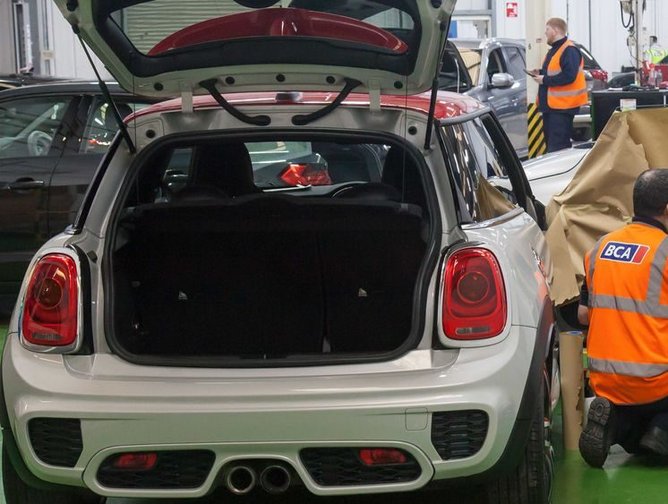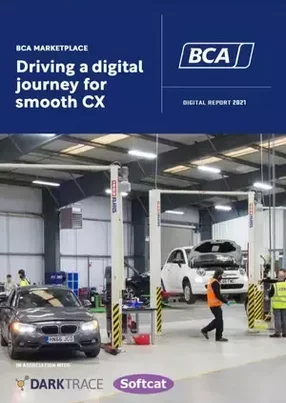For most people buying a car is an aesthetic experience, from the colour to the smell of the leather interior and purr of a finely tuned engine. Zero-emission and safety may also be practical considerations, but there is no denying the power of the look and feel of a car for consumers who place the purchase of a vehicle just below buying a house.
Despite the COVID-19 pandemic - which put pay to the traditional buying of an automobile from a showroom or auction - Robert Teagle, Group CIO of Constellation Automotive Group, BCA owners, predicts a bright future for the used car industry as he works to sync up the physical and digital world to provide a smooth customer experience.
BCA, formerly British Car Auctions, now has to balance how they accelerate forward with their digital transformation without losing that aesthetic experience for the customer. The company specialises in multi-channel auctions of second hand cars, vans and trucks from leading European vehicle vendors.
From dock to defleet - BCA touches more than 3.5 million vehicles a year working with OEMs, fleet operators and dealers to provide the backbone of the UK's automotive supply chain. Founded in 1946, BCA sits alongside WeBuyAnyCar.com and cinch - all within the Constellation Automotive Group.
Teagle outlines how the company will move forward offering its customers a seamless online experience while harnessing the power of new technology to provide those personal touches which makes buying a vehicle so important.
“We will be doing everything we can to sync the physical and digital world to provide the ultimate customer experience,” said Teagle speaking from his office in Farnham. He is optimistic about the car industry as we move out of the pandemic. “Car sales will start to rise as people seek the safety and convenience of a vehicle to avoid the crowds on public transport.”
Technology creates the physical experience
Teagle, who hit the ground running when he joined BCA, just prior to the start of the pandemic in November 2019, comments on how the company’s digital journey will focus on a post-pandemic future with face-to-face video, the expansion of omni-channel technologies along with robots and Artificial Intelligence (AI).
“If we look a few years ahead we will be able to experience being inside a vehicle without physically being in there,” predicts Teagle. “A customer will also be able to get that feeling of driving a vehicle without actually doing it and this experience is not far off.
“When you think about the fact that so many people are looking online for purchasing more products, there is no reason why vehicle sales can't continue to grow and we will continue to do as much as we can to sync up the physical digital world.
“People like to touch, they like to get in a car and consciously take it for a test drive. So what we are trying to do is offer as much of that as we can, through the digital experience which will come in the shape of Virtual Reality (VR), Augmented Reality (AR) and imaging technology,” said Teagle who pointed out they have not quite arrived at this end state but this will evolve as the platform continues to mature over time.
Cars under the virtual hammer
One online experience which has taken off during the pandemic is BCA’s auction platform which pre-COVID did 70 per cent of sales physically.
“One of the best examples of platform modernisation is our buyer platform that underpins our UK remarketing auction business. When the pandemic began, we obviously had to shift a 100 per cent of those sales digitally as the physical auction centres were closed.
“What we're trying to do is mirror that physical experience from arriving at an auction centre, collecting your catalogue, looking around those vehicles, the process of bidding on a vehicle, paying for a vehicle and to then collecting it.
“Pre-COVID the digital technology we had in place supported some of these activities, but not all. So we needed to change that to support the post-COVID world and took our cues from other B2C industries and looked at ways of enhancing the user journeys.
“Although the changes have been brought about by the pandemic it is also partially because of the digital experiences customers receive in retail, travel or healthcare as they are raising the bar.
“From an auto industry perspective, I think we have to kind of meet the customers as well in that same way. It’s important we continue to adapt but we're not going to be 100 per cent digital as the physical side is going to continue and dealers will continue to exist.
“I think people will still want that physical presence, but we have to work out how the digital world can sit side-by-side and then what digital experiences and opportunities exist in the auto world that can enhance the customer experience,” he said.
This includes the following:
- Improvement of online images of each vehicle
- Making it easier to find vehicles with a better search engine
- Improve the bidding process which now allows proxy bidding
- Simple online payment process
- Click and collect which helps book transport and delivery tracking
“Although we talk about our business being a B2B business, what we're now looking at offering is a much more B2C experience as the comparative experience for our buyers will be retail e-commerce platforms. Then behind that, you need to have the right infrastructure in place to ensure you can adapt quickly, scale as needed and deliver what the business needs - moving into a private or public cloud infrastructure enables us to do that,” he said.
The Constellation Automotive Group is made up of a number of different divisions:
Consumer-to-business - WeBuyAnyCar
Business-to-business:
- BCA UK offering an auction service, refurbishment and stores
- BCA Automotive which is the vehicle transporter fleet
- BCA Logistics which is the single-plated vehicle movements using plated drivers
- BCA Europe which is the remarketing and transportation services within 13 countries
Business-to-consumer - which provides used cars to the consumer market, cinch
“All of the divisions that we have in the group are focused on the automotive value chain which offer a wide range of services to consumers and businesses,” commented Teagle.
Competitive advantage
BCA is uniquely positioned to help their customers right through the automated value chain from factory door to vehicle end of life. “We've got the solutions and services to support all parts of that journey. We offer best in class products to help with those, whether that's an OEM or manufacturer fleet company, dealers and finance companies,” pointed out Teagle.
“We make sure that the automotive market is moving and the value chain is well supported so we can continue to leverage the different parts of the group and sync everything together,” commented Teagle.
Pandemic jump starts digital journey
Teagle joined BCA a few months before the COVID-19 pandemic hit, giving him a short amount of time to do his initial assessment and put an action plan into place. He is responsible for all the technology across the group and when the country went into lockdown he had to ensure all employees had the right digital capabilities from laptops, tablets, mobile phones and access to collaboration platforms to do their jobs.
“Firstly we had to accelerate the rollout of that technology to ensure everyone was digitally enabled and could continue to do their role, he said. “A lot of this was already in place but not for everybody if they were going into the office or workshop every day.
“Secondly, it was to look at the areas of the business and technology that were being impacted or needed to change as part of the response to COVID-19. As part of the action plan we had a number of areas that we were looking to address as part of our transformation such as CRM and adapting our products. But we quickly had to establish how we needed to accelerate them to fit in with the requirements from a pandemic perspective.
“For example, we knew we had to transform our CRM processes and technology. We knew that they had to be accelerated because that would be a key enabler for us as part of the pandemic timeframe. It forced us to look at areas we hadn’t identified as part of our action plan, but we knew we would have to rethink as the pandemic was so disruptive. Examples include, moving our payment processes online, looking at areas like open banking, which we didn't have on our roadmap, that could significantly impact the customer experience.
“Thirdly, it is looking at all the pressures and demands that a digital transformation plan has on the underlying infrastructure and architecture as transactions and activities move online. Having a robust, resilient, scalable infrastructure is key to success. Doing that complete assessment in light of COVID was critical.
“At the beginning of the year we created our three-year strategy which takes into account our original action plan, coupled with all the lessons we've learned from COVID and the subsequent changes and additions we need to support digital transformation.”
Teagle pointed out what has amazed him during the past year is the speed of change which he says has been “unpredictable and challenging”.
“The amount of change and the speed that we've had to deliver in such a short space of time has really been a game changer. It's a team effort to be able to do that but it goes to show what we can deliver and what we're capable of delivering to meet the business goals.”
Snowball effect of digitisation
Teagle reinforced the fact that BCA is focused on digitising as much of the journey as possible for the benefit of vendors, buyers and employees but admits the industry is going through a radical change.
“When you start to digitise a process, like the buyer example, you realise there are many connected processes that also must be digitised. For example, if you've transacted fully online, then your customer service function needs access to that transaction, the related transactions and your account details, to ensure that any questions that the buyer might have they can answer, again digitally or via self-service. It's not only the digital transactions that you have to look at but all these related processes.
“When you think about a digital transformation it's almost like a snowball rolling down the hill, once you start, you can't stop it halfway down, you have to keep that level of change going. It's going to be always constant particularly as technology changes and customer demands change.
“It’s going to be a continual evolution of all the different parts of our business with probably no stone unturned as we make this journey over the next 12 to 24 months.
I think that gives us a great opportunity to move the business forward, move technology forward and drive the transformation and empower the business to be more successful,” he said.
Ecosystem which drives change
The digital transformation of BCA is not a journey they have embarked on alone. A tapestry of partners include:
- Darktrace
- Softcat
- Salesforce
“Our partners across software and hardware services are critical for us enabling us to meet our objectives,” said Robert Teagle, Group CIO of Constellation Automotive Group, BCA owners. “We look for partners that have the same ambition as us to drive that digital transformation and we think about our partners as an extension of our IT team.”
Darktrace is BCA’s key security partner to provide cyber defence within their estate. Softcat works with them as a key IT service partner by helping across both the end-user and enterprise technologies.
“Salesforce also plays a critical role in our CRM contact centres and our customer service functions and MuleSoft with our integration platforms. BT, is our telecoms and network partner, supporting all of the infrastructure across our sites in the UK and then Cloudshift helps us to be the Salesforce implementation partner and help to drive forward our Salesforce transformation project.
“There's no way we could be as successful as we have been without having these key partners,” said Teagle.
What is Constellation Automotive Group?
Constellation Automotive Group encompasses some of the UK and Europe’s most successful automotive companies, WeBuyAnyCar, BCA and cinch. Robert Teagle, Group CIO of Constellation Automotive Group, BCA owners, explains the relationship.
“The rebrand from BCA Marketplace to Constellation Automotive Group, is recognition that although we have a strong brand in BCA the make-up of the group is such that we needed a different brand to signify all the different group activities, such as the divisions and brands mentioned previously. It’s to make a clear recognition that the group is made up of a number of market leading brands beneath it, as well as allowing for our future growth.”
Sustainable motoring
As we enter the dawn of a new era of motoring with the electric vehicle (EV) revolution, BCA is putting sustainability at the top of their agenda.
The UK government’s pledge to ban the sale of all new non-electric cars, including gasoline, diesel and hybrid vehicles from 2035, highlights the drive to end the nation’s contribution to Climate Change by 2050.
The Road to Zero strategy will see the evolution in all vehicles from using ultra-fast wireless charging to the repurposing of car batteries. With the electrification industry estimated to be worth over £6bn (US$7.8bn) by 2025, the next decade presents a massive opportunity.
“The future of sustainable motoring is at the top of our mind at present,” said Robert Teagle, Group CIO of Constellation Automotive Group, BCA owners. “We're already working on servicing the needs of our customers with the right charging infrastructure to support hybrid and electrical vehicles and investigating the use of alternative fuels for larger vehicles in the B2B space.
“There's no doubt with the government targets that have been set, alternative fuels will be just one facet of that, as we’re also looking at areas such as different ownership models and car sharing. Working with our partners across the automotive space will be front and centre of looking at how the move to sustainable monitoring is going to go and helping our customers make that move,” he said.



